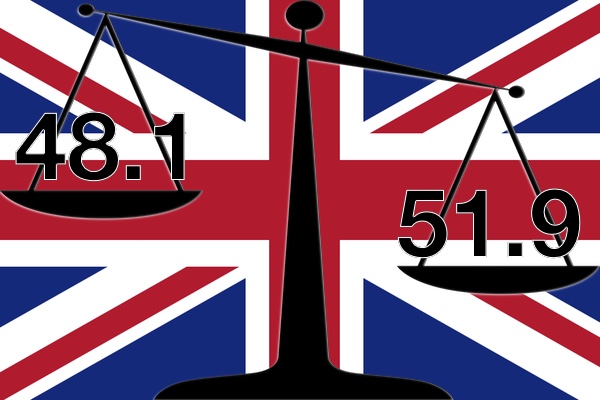It Was Dumb to Allow a Simple Majority to Decide an Issue as Big as Brexit

The shocking news that a majority of British voters wanted to leave the European Union aroused some advocates of “Remain” to take action. They circulated a petition on a website demanding another vote. Those petitioners want the referendum of June 23 annulled if either side cannot win by at least 60% in a new plebiscite or if the turnout is less than 75%.
Securing a second vote on Brexit will not be easy, but it is worth a try. UK leaders were foolish to allow a simple majority to resolve such an important matter. Petitioners were correct when they demanded more substantial evidence of the public’s commitment to change. The fundamental structure of the UK’s political, economic, and social arrangements should not be altered so easily.
When petitioners construct a rationale for their cause, they can draw lessons from the example of America’s Founding Fathers. Framers of the U.S. Constitution worried that special interests could excite the masses into endorsing extreme approaches for dealing with societal problems. To prevent America’s new federal government from going off the rails, the Constitution’s framers established a variety of checks and balances.
America’s Framers had witnessed the excesses of popular democracy. Under the Articles of Confederation (1781-1789) inflation in America spiraled, creditors and debtors clashed, and Shays’s Rebellion, a farmers’ protest, escalated into armed insurrection. Delegates at the Philadelphia convention worried that in times of anxiety and tumult groups representing special interests can dominate government affairs and force their will upon the entire society.
James Madison and other framers recommended a system of checks and balances to ensure that momentary political excesses could not easily take the society off-course. They demanded supermajorities for major actions in government’s affairs. Relevant to the present-day Brexit debate, the Founders made it very difficult to change the Constitution. Amendments required two-thirds support in both houses of Congress (or application by two-thirds of the states). After passing that test, an amendment needed to be ratified by three-fourths of the state legislatures. These tough requirements made significant adjustments in the Constitution’s framework a rare achievement.
The Framers’ example is relevant to the Brexit controversy, because the Leave campaign demonstrated some of the excesses that America’s Founders worried about. Voters agreed to big changes on the basis of questionable evidence and limited understanding of the implications. Already, many in the UK who voted for Brexit are having second thoughts. They recognize that much of the Leave campaign was based on misrepresentations, fear-mongering, and in some cases outright lies. Politicians promised, for example, that Brexit would produce huge financial gains that could be applied to health care. It is now clear that membership in the EU gave the UK greater economic benefits than many voters realized. It is also clear that Brexit may inspire leaders Scotland and Northern Ireland to call for independence. Economic repercussions are already appearing. The sterling hit a 31-year low, stocks tumbled, and the UK’s credit rating took a hit.
America’s framers established a better process for dealing with appeals for radical alterations in governance. They provided checks and balances that forced advocates of radical change to convince a large percentage of the population that their proposals were wise. In a related way, advocates of Brexit ought to prove that their cause has substantial and long-term backing. Winning over 60 percent of the voters – the recommendation of current petitioners – is a generous proposal. Since the stakes are high, a more reasonable approach could resemble the one recommended by delegates who crafted the U.S. Constitution. A requirement of two-thirds vote seems appropriate in a fundamentally important decision like EU membership.
Parliament can provide a remedy. Its agreement will be necessary to repeal the legislation of 1972 that brought the UK into the EU. MPs can override the non-binding referendum of June 23. They can demand stronger evidence of support for Brexit.
America’s Founding Fathers demonstrated bold leadership when they made the controversial decision to gather in Philadelphia in 1787. They showed the courage to replace failed governance under the Articles of Confederation with a new Constitution. Their task was not easy. In lengthy debates about ratification, they defended their cause in the face of powerful opposition. Now leaders of the UK are facing a related challenge. They can accept the results of a flawed referendum or take bold steps to restore stability and prosperity. The choice should be obvious. They should insist that proposals for radical change, such as Brexit, receive lengthy, thoughtful, and cautious deliberation.